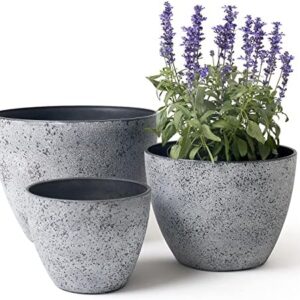Organic gardening has become increasingly popular in recent years, as people become more aware of the harmful effects of synthetic chemicals on the environment and our own health. But what exactly is organic gardening, and what is the science behind it?
Organic gardening is a method of growing plants that relies on natural processes and materials to nurture the soil and plants, rather than chemical fertilizers and pesticides. The goal of organic gardening is to create a healthy and sustainable garden ecosystem that supports plant growth without harming the environment.
One of the key principles of organic gardening is nurturing the soil. Healthy soil is the foundation of a successful garden, providing essential nutrients and a structure for plants to grow. In organic gardening, soil is viewed as a living ecosystem, full of microorganisms, insects, and other organisms that play a crucial role in maintaining soil health.
One of the ways organic gardeners nurture their soil is by adding organic matter, such as compost, to provide nutrients and improve soil structure. Compost is a mixture of decomposed organic materials, such as kitchen scraps, yard waste, and manure, that provides a rich source of nutrients for plants. By adding compost to the soil, organic gardeners can improve soil fertility, increase water retention, and support a diverse community of soil organisms.
Another important aspect of soil health in organic gardening is maintaining a balance of nutrients. Synthetic fertilizers can disturb this balance by providing plants with an excess of certain nutrients, leading to nutrient imbalances and soil degradation. In contrast, organic gardeners use natural fertilizers, such as compost and manure, that release nutrients slowly and support a more balanced nutrient profile in the soil.
In addition to nurturing the soil, organic gardeners also focus on nurturing the plants themselves. One of the key principles of organic gardening is promoting plant health through natural methods, such as crop rotation, companion planting, and biological pest control.
Crop rotation is a practice in which different crops are planted in a sequence to prevent soil depletion and control pests and diseases. By rotating crops, organic gardeners can break the life cycles of pests and pathogens, reduce the buildup of soil-borne diseases, and improve soil fertility.
Companion planting is another natural method used in organic gardening to promote plant health. Certain plants have beneficial relationships with each other, such as repelling pests, providing nutrients, or attracting beneficial insects. By planting these companion plants together, organic gardeners can create a diverse and supportive ecosystem that enhances plant growth and resilience.
Biological pest control is an important aspect of organic gardening that relies on natural predators and other beneficial organisms to control pests. Many insects, such as ladybugs, lacewings, and parasitic wasps, feed on garden pests and help keep their populations in check. By encouraging these natural enemies of pests, organic gardeners can reduce the need for synthetic pesticides and create a more balanced and sustainable garden ecosystem.
In addition to nurturing the soil and plants, organic gardening also has important implications for human health. By avoiding synthetic chemicals in the garden, organic gardeners reduce their exposure to harmful toxins that can impact their health. Studies have shown that exposure to synthetic pesticides and fertilizers can contribute to a range of health problems, including cancer, respiratory issues, and neurological disorders.
In contrast, organic gardening offers a more natural and sustainable approach to growing plants that supports human health. Organic fruits and vegetables are free from synthetic pesticides and fertilizers, making them safer and healthier to eat. By growing their own organic produce, gardeners can also ensure that their food is fresh, nutritious, and free from harmful chemicals.
Overall, organic gardening is not just a trend or a fad – it is a science-based approach to gardening that promotes environmental sustainability, plant health, and human well-being. By nurturing the soil, plants, and our own health through natural methods, organic gardeners can create thriving gardens that benefit both people and the planet. So, whether you’re a seasoned gardener or just starting out, consider giving organic gardening a try and experience the science behind nurturing your soil, plants, and health.






